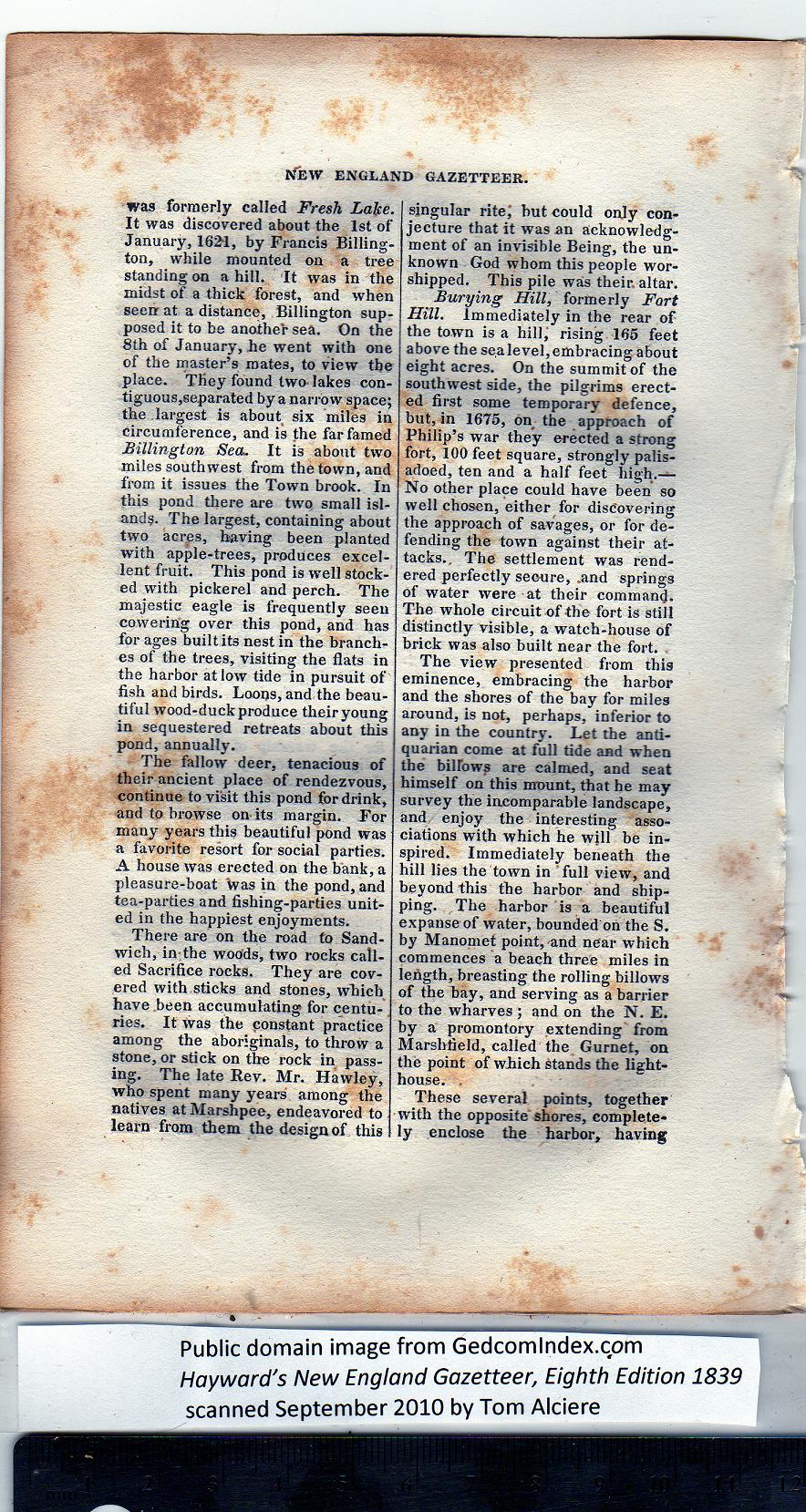|
was formerly called Fresh Lake.
It was discovered about the 1st of
January, 1621, by Francis Billing-
ton, while mounted on a tree
standing on a hill. It was in the
midst of a thick forest, and when
seen at a distance, Billington sup-
posed it to be another sea. On the
8th of January, he went with one
of the master’s mates, to view tbe
place. TKey found two lakes con-
tiguous,separated by a narrow space;
the largest is about six miles in
circumference, and is the far famed
Billington Sea. It is about two
miles southwest from the town, and
from it issues the Town brook. In
this pond there are two small isl-
and?. The largest, containing about
two acres, having been planted
with apple-trees, produces excel-
lent fruit. This pond is well stock-
ed with pickerel and perch. The
majestic eagle is frequently seen
cowering over this pond, and has
for ages built its nest in the branch-
es of the trees, visiting the flats in
the harbor at low tide in pursuit of
fish and birds. Loops, and the beau-
tiful wood-duck produce their young
in sequestered retreats about this
pond, annually.
The fallow deer, tenacious of
their ancient place of rendezvous,
continue to visit this pond for drink,
and to browse on its margin. For
many years this beautiful pond was
a favorite resort for social parties.
A house was erected on the bank, a
pleasure-boat Was in the pond, and
tea-parties and fishing-parties unit-
ed in the happiest enjoyments.
There are on the road to Sand-
wich, in the woods, two rocks call-
ed Sacrifice rocks. They are cov-
ered with sticks and stones, which
have been accumulating for centu-
ries. It was the constant practice
among the aboriginals, to throw a
stone, or stick on the rock in pass-
ing. The late Rev. Mr. Hawley,
who spent many years among the
natives atMarshpee, endeavored to
learn from them the design of this
singular rite, but could only con-
jecture that it was an acknowledg-
ment of an invisible Being, the un-
known God whom this people wor-
shipped. This pile was their, altar. |
Burying Hill, formerly Fort
Hill. Immediately in the rear of
the town is a hill, rising 165 feet
above the se.alevel,embracing about
eight acres. On the summit of the
southwest side, the pilgrims erect-
ed first some temporary defence,
but, in 1675, on the approach of
Philip’s war they erected a strong
fort, 100 feet square, strongly palis-
adoed, ten and a half feet high.—
No other place could have been so
well chosen, either for discovering
the approach of savages, or for de-
fending the town against their at-
tacks., The settlement was rend-
ered perfectly secure, .and springs
of water were at their command.
The whole circuit of the fort is still
distinctly visible, a watch-house of
brick was also built near the fort.
The view presented from this
eminence, embracing the harbor
and the shores of the bay for miles
around, is not, perhaps, inferior to
any in the country. Let the anti-
quarian come at full tide and when
the bilTows are calmed, and seat
himself on this mount, that he may
survey the incomparable landscape,
and enjoy the interesting asso-
ciations with which he will be in-
spired. Immediately beneath the
hill lies the town in full view, and
beyond this the harbor and ship-
ping. The harbor is a beautiful
expanse of water, bounded on the S.
by Manomet point, and near which
commences a beach three miles in
length, breasting the rolling billows
of the bay, and serving as a barrier
to the wharves; and on the N. E.
by a promontory extending from
Marshfield, called the Gurnet, on
the point of which stands the light-
house. .
These several points, together
with the opposite shores, complete-
ly enclose the harbor, having |
